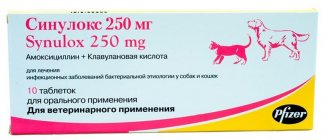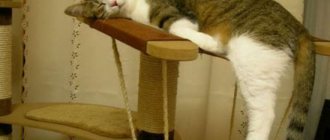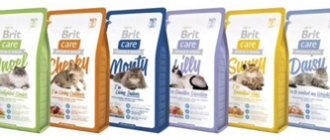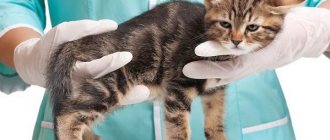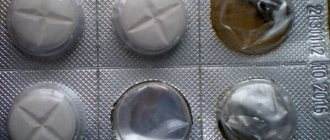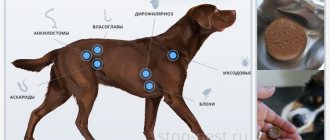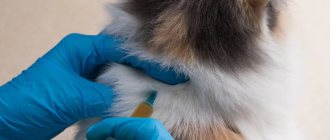6030Pavel
How nice it is to watch a kitten frolic cheerfully, even if at the same time he plays pranks so much that flower pots fly off the shelves. However, a pet can remain cheerful and healthy only by receiving high-quality nutrition that provides a full range of vitamins. Moreover, brewer's yeast plays an important role for cats. Unfortunately, our pets often get sick without any particular reason, and every owner of a delicate cat wonders what causes the appearance and development of a complex illness. The answer is quite banal - lack of vitamins.
How to give your cat regular brewer's yeast
When taking homemade yeast, it is necessary to balance the animal’s nutrition according to the BARF system. According to this method, fungi are given with a mixture of products that can be ground using a blender:
- 65% chicken breast;
- 10% chicken heart and the same amount of salmon fillet;
- 5% each of wheat bran, chicken liver, seaweed, yeast;
- 1 drop of green wheat germ oil.
When using preparations based on brewer's yeast as an additional therapy for chronic diseases, it is necessary to strictly adhere to the specified daily fungal norms. There is no overdose from using the drugs, but yeast can interfere with the therapeutic effect of other drugs used.
Live or dry. Cats are given yeast only in dried form. In a liquid environment, microorganisms are activated and begin to cause fermentation. Live fungi can cause intestinal upset, which can worsen your pet's condition. The pathology is accompanied by diarrhea, vomiting, and flatulence.
This is interesting: How to make friends between a dog and a kitten
Brewer's yeast in pet diets
Like baking yeast, brewer's yeast is a collection of single-celled microorganisms called microscopic fungi. However, the types of such fungi are different for these types of yeast. Fungi in brewer's yeast from the class of Saccharomycetes - Saccharomyces cerevisiae.
Composition of brewer's yeast?
- protein – 50%, complete and easily digestible
- fat – up to 3%
- carbohydrates – up to 40%
- 17 essential amino acids, most of which are essential
- minerals: potassium, magnesium, calcium, copper, iron, sodium, manganese, etc.
- vitamins: D, E, F, K and group B
- biotin
- ribonucleic acid
Unique properties
Brewer's yeast has a number of beneficial properties, among which the most important for animals are anti-inflammatory and anti-allergic. They reduce itching and relieve inflammation. Among other things, the benefits of brewer's yeast include the following:
- stimulation of metabolic processes
- strengthening the immune system
- removal of waste and toxins
- improved appetite
- improvement of intestinal motility
- strengthening and improving coat
- reduction in shedding time
- strengthening the nervous system
Veterinarians often prescribe brewer's yeast to animals suffering from allergies, dermatitis, autoimmune diseases, as well as chronic diseases - neuroses, pancreatitis, nephritis, hepatitis, etc.
Brewer's yeast is the best remedy for the beauty and health of skin and coat. They help reduce itching and dry skin, relieve irritation and inflammation. Yeast also increases stress resistance. If your pet is experiencing anxiety or stress, or is afraid of loneliness, then brewer's yeast is the best natural way to cope with them.
Despite all the listed medicinal properties, pet owners often doubt whether brewer's yeast can be consumed by dogs and whether it is suitable for cats?
Can dogs have brewer's yeast?
Breeders have been using brewer's yeast for dogs for many years. This began even before the advent of ready-made food containing such a component. Brewer's yeast plays a special role in the process of bone growth in puppies. Small pets are fed with them in order to avoid the development of rickets. Among other things, breeders note a tendency to reduce nervousness and stress in puppies that are given brewer's yeast.
As for adult dogs, the main indication for taking brewer's yeast has always been a problem with hair. Out-of-season shedding, allergic skin manifestations and simply the desire to make the coat thick and shiny - all this can be solved by introducing brewer's yeast into the animal's diet. They are often used during seasonal shedding to speed up its progression, relieve itching and promote the growth of new beautiful fur.
Brewer's yeast will be indispensable for hunting breeds of dogs, as well as animals participating in various cynological competitions.
Like any other food additive, yeast is beneficial for the health of the animal, but there is one “BUT”. They must be used in strictly recommended doses. Otherwise, adverse reactions may occur. If a dog has eaten more brewer's yeast than recommended by the manufacturer, it may develop a skin rash with severe itching. A similar reaction also occurs in dogs with individual intolerance or allergy to this component.
Can cats eat brewer's yeast?
Brewer's yeast is often given to cats instead of synthetic vitamins. It is believed that yeast is a natural component that is perceived by the animal’s body as food. Therefore, beneficial substances are more easily absorbed.
Owners of cats after a course of taking brewer's yeast to their animals noted a clear improvement in the condition of the coat. The fur became thicker and shinier. In addition, the molting time of purring pets was significantly reduced. As for off-season molting, for a certain period it almost completely stopped.
Brewer's yeast is introduced into the diet of kittens at 2 weeks of age. This is done if small pets do not receive enough nutrition or there is a veterinarian’s indication.
A contraindication to the use of brewer's yeast for cats is the animal's individual intolerance or allergy to this component.
Product benefits
Yeast contains:
- amino acids - participate in the development of skeletal muscles of the animal;
- 14 types of vitamins and vitamin-like compounds - affect the functioning of all internal organs, are responsible for the structure and quality of the coat, and prevent flaking of the pet’s skin;
- mineral components: sulfur, zinc, potassium, magnesium, phosphorus and selenium - necessary for the musculoskeletal system;
- proteins – used in the cellular renewal of soft tissues as a building material;
- oligosaccharides – help increase the cat’s physical activity, suppress the growth of pathogenic microflora and parasites in the intestines;
- fatty acids are good for vision and blood vessels.
Benefits for the cat's body. Yeast has a positive effect on the pet’s body:
- promote the growth of healthy silky coat;
- relieve swelling in the subcutaneous fat, preventing the development of dermatitis;
- accelerate tissue regeneration;
- reduce the risk of hypovitaminosis;
- strengthen the immune system;
- improve the process of hematopoiesis and intracellular metabolism;
- normalize the psycho-emotional state;
- increase appetite, regulate weight;
- shorten the period of hair loss.
The condition of the hairline improves within 2 weeks from the moment yeast is included in the diet.
The natural remedy, unlike synthetic multivitamin complexes, does not place additional stress on the liver and digestive tract. Yeast does not cause stomach upset because your pet's body digests fungi like regular food.
Beneficial Side Effects of Yeast
Typically, yeast is introduced into a cat’s diet to compensate for its need for B vitamins. Observations from veterinarians have shown that there are two more beneficial effects:
- Yeast increases appetite, which is very useful for cats who are picky eaters. Yeast is often used at the stage of transitioning a cat from dry to natural food.
- Observations have shown that after 1–2 months, fleas stop attacking the cat. We can say that a cat that consumes yeast becomes unpalatable to parasites.
Indications for the purpose and use of nutritional yeast
Accordingly, the drug shows maximum effectiveness in the following cases:
- Vitamin deficiencies.
- It is very useful to give to old cats and cats, as the supplement can delay the process of final aging of the body and improve the quality of life of an elderly pet.
- The recovery period after serious illnesses, injuries, and in the postoperative period.
- Tremors are very useful for pregnant and lactating cats.
- The drug is prescribed to cats and female cats actively used for reproductive purposes.
- Brewer's yeast is actively used by animal owners who often participate in exhibitions. As we wrote above, the drug relieves the effects of stress, and also contributes to a noticeable improvement in the condition of the skin and coat.
- In addition, nutritional yeast is very useful for animals recovering from severe helminthic infestations.
Pharmaceutical effect of brewer's yeast
The food additive has a multifaceted positive effect on the animal body:
- Improving the digestion process, normalizing metabolism.
- Doctors have long known that brewer's yeast helps normalize body weight. If the cat is too plump, then with regular use it will lose weight. Excessively thin pets will gain normal body weight due to muscles and a small amount of fatty tissue.
- Since yeast contains chromium, it significantly improves the condition of cats suffering from diabetes.
- Antioxidants (in particular, vitamins D and E) have a beneficial effect on the body of old pets, significantly slowing down the aging process.
- A balanced natural complex of vitamins, macro and microelements supports the body of pets with oncological pathologies.
- Brewer's yeast is indicated for cats that often participate in exhibitions and other events that cause severe stress. Brewer's yeast can effectively stop their consequences.
- The nutritional supplement is indicated for pets recovering from serious illnesses and injuries, as it helps restore strength.
- Among the positive properties of yeast is the normalization of the cardiovascular system.
- Nutritional yeast normalizes blood pH.
Finished drugs: properties, indications and dosage
If you don’t want to give your cat untested homemade yeast, you can use special products. There are a number of veterinary preparations, the main active ingredient of which is unicellular fungi. Nutritional supplements differ in the content of auxiliary components:
- With garlic . Has antibacterial, antiparasitic or anthelmintic effect. Allicin contained in garlic cloves destroys the cell wall of microbes, preventing the development of infectious diseases in cats.
- With taurine . Thanks to the organic substance, the functioning of the pet’s cardiovascular system improves.
- Calcium containing . Strengthens the musculoskeletal system and has an anti-inflammatory effect.
- With succinic acid . Indicated for mustachioed, striped, immunocompromised and elderly individuals. They have a general strengthening effect on the animal’s body. Succinic acid stabilizes redox reactions and normalizes the acid-base balance. As a result, resistance to stress increases and toxins are removed from the body.
- With seaweed . Kelp, due to its high content of soluble fiber, cleanses the gastrointestinal tract of toxins, and organic acids inhibit the growth of parasites. Is a source of iodine. Carotenoids and chlorophyll improve the absorption of nutrients in the small intestine.
- Sulfur containing product . Strengthens the ligamentous apparatus, improves joint function. Sulfur increases the metabolic rate and has a beneficial effect on the cat’s coat.
- With zinc . The microelement regulates intracellular metabolism, accelerates regeneration and cellular renewal of tissues.
- Yeast and chitosan . The latter is the active substance of crustacean shells. Forms a complex with salts of heavy metals, safely removing them from the cat’s body.
- With microelements. They are used in strict dosages due to the risk of developing hypervitaminosis. Yeast with minerals improves immunity and speeds up the rehabilitation of a furry pet after serious illnesses. Recommended for use by cats only for medical reasons as an additional therapy.
Complex means. There are complex preparations that include several nutritional compounds. The protein-vitamin product has a positive effect on the cat’s body with a lack of mineral components and against the background of metabolic disorders. Brewer's yeast is used not only for the prevention of vitamin deficiencies and dermatological diseases.
Indications for use. Brewer's yeast for cats is prescribed for:
- carrying out preventive measures for mineral deficiency;
- deterioration of coat quality, frequent hair loss, long periods of molting;
- immunosuppressive state;
- frequent infectious diseases;
- in order to shorten the rehabilitation period after recovery;
- metabolic disorders;
- vitamin B deficiency, neurological disorders;
- eczema, dermatitis;
- unbalanced diet;
- carbohydrate metabolism disorder;
- diseases of the digestive system;
- poisoning;
- damage to the vibrissae;
- period of adaptation to the new environment;
- acidosis, acid-base metabolism disorder.
Rules for administration and dosage. Oral preparations based on brewer's yeast are given to cats on a regular basis. Every day in the morning, medicines are added to a small amount of food. You can let your pet swallow the medication on its own. The yeast has a pleasant smell to cats, so there won't be any problems.
A single dosage is determined at the rate of 1 tablet weighing 50 mg per 5 kg of cat’s live weight.
No preliminary preparation for the course of therapy is required - no need to subject your pet to a starvation diet, give laxatives or change the diet. To prevent infectious diseases and parasitic infestations, the drug is given according to a certain algorithm:
- 1 tablet during meals or after meals 2-3 times a day;
- for a single use, the dosage is determined at the rate of 0.5 g tablet per 3 kg of live weight, the duration of therapy is 3 days;
- kittens are given ½ tablet 1-3 times a day.
What is the cause of serious illnesses
The bodies of cats forced to live in large cities are subjected to the same stress as humans. The impact of the environment, which is polluted by various exhausts, organic emissions and other chemicals, has a negative impact. This has a detrimental effect on the general condition of the cat’s body, manifesting itself in insufficient muscle mass, problems with the gastrointestinal tract, and joint pain. The emotional sphere suffers no less. Some cats show excessive aggression, others become completely indifferent or overly fearful.
© shutterstock
Modern man is no longer able to enjoy only clean air, communicate only with wild nature, or consume exclusively natural products. Therefore, it is important to learn to be healthy, keeping pace with technological progress. Excel brewer's yeast with calcium becomes an invaluable helper for cats. They are the most valuable nutritional supplements, containing a full complex of vitamins that belong to group B. Yeast has a beneficial effect on metabolism and significantly strengthens the immune system.
Contraindications
Despite the benefits, in some cases it is not advisable to prescribe brewer’s yeast (or do so after prior consultation with a veterinarian):
- It is not advisable to give them to kittens under six months of age.
- Despite all the benefits, the supplement is also contraindicated for cats over 11 years of age due to too high amounts of amino acids, which is not very good for the kidneys (and pets at that age will still have problems with them).
- Accordingly, they are contraindicated for kidney disease.
- Yeast should not be given if the animal is allergic to any of its components.
- Although there are no restrictions on feeding pregnant cats, we recommend that you consult a veterinarian before doing so.
This is interesting: Why do cats massage?
Is it possible to give baker's yeast to a cat?
Baking product is different from brewer's yeast. It is not suitable for pets. The active components immediately cause fermentation when released into a liquid medium. When administered orally, baker's yeast enters the cat's stomach, where there is mucus, hydrochloric acid, and water. As a result, the active fermentation process causes indigestion. The pathology is accompanied by characteristic symptoms:
- physical activity decreases;
- attacks of nausea appear;
- there is a refusal of food and water;
- there is no response to the owner’s commands;
- diarrhea is observed.

